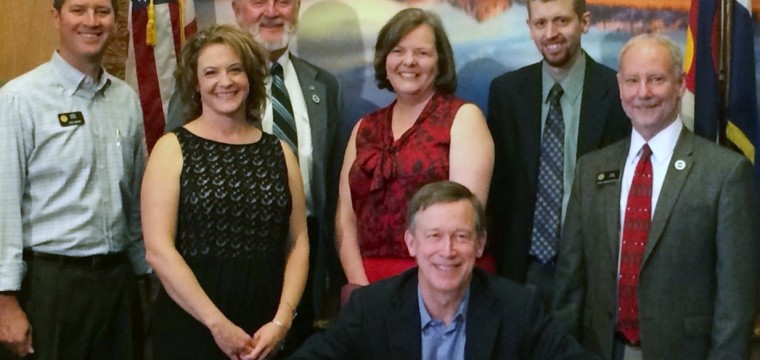In a couple of major ways, and some minor ones, this week certainly didn’t go according to my plans. But I’ve already had the chance to see clearly how one of those unwanted developments probably worked out for a better purpose. Despite the challenges and setbacks, this week also included my first gubernatorial bill signing (as pictured above — House Bill 1382, K-12 Online Education) and National Donut Day. So there’s no need to complain too much, right?
All that and my latest Complete Colorado column led to a Thursday morning appearance on the Mandy Connell Show (630 KHOW).
From the Independence Institute
- Amy Oliver Show: Orsch Private School Tests Education Ideas (Podcast)
- New ACE Study Opens Mind on Comparing Public, Private Schools (Ed Is Watching)
- Jeffco Board Member Offers Tax Hike as Charter Funding “Compromise” (Ed Is Watching)
- Look at Private School Regulation Sells Choice through Scholarship Tax Credits (Ed Is Watching)
Finished One Good(read) Book This Week
 America’s Great Debate: Henry Clay, Stephen A. Douglas, and the Compromise That Preserved the Union by Fergus M. Bordewich
America’s Great Debate: Henry Clay, Stephen A. Douglas, and the Compromise That Preserved the Union by Fergus M. Bordewich
My rating: 4 of 5 stars
This book stands very near what truly good narrative history should look like. Though I am a well-studied devotee of mid-19th century America, I found a few new insights from Bordewich’s well-researched account. More noteworthy are the colorful portraits of the national political leaders, a veritable gallery of statesmen and rogues (and everything in between) at the center of the storm that culminated in the Compromise of 1850. Among those who come vividly to life are the revered but ill-fated aging Henry Clay, the self-made rising star Stephen Douglas, the accidental president Millard Fillmore, little known but still interesting figures like Henry Foote and Thomas Hart Benton, and many more.
The book deepened my appreciation for the Compromise of 1850 as a remarkable piece of statecraft that staunched the bleeding of a national wound torn open by rapid territorial expansion and the blight of slavery. The Compromise was a cleverly packaged moral disgrace that, Bordewich explains, ought to be appreciated for the critical decade of economic growth and maturity it bought to make possible a Union cleansed of its “original sin” of slavery. Read in the context of a number of other insightful works on the period, especially those by William Freehling and David Potter, Bordewich’s book further solidifies in my mind the belief that American slavery was not going to disappear naturally and that the U.S. Civil War was tragically unavoidable.
Top Facebook Links of the Week
- The Kind of News to Start Off a Weekend Right: Denver Judge Tosses Teachers’ Mutual Consent Lawsuit (Chalkbeat Colorado)
- A Stirring Remembrance, A Powerful Legacy: Tom Brokaw Marks 70 Years after D-Day (Today Show)
- Couldn’t Have Seen This Coming: Are Dems Trying to Tilt the Scales in GOP Primary? (Complete Colorado)
- Comments to Pad the Resume By: Second Open Forum: School Budget Brings Discussion Concerns (Loveland Reporter-Herald)
- A New Strategy Born Out of Necessity? Alabama GOP Gets Dose of Teacher Union Bipartisanship (Education Intelligence Agency)
Twitter Verse of the Week: The purpose in a man’s heart is like deep water, but a man of understanding will draw it out. http://bible.com/59/PRO20.5

Leave a Reply
You must be logged in to post a comment.